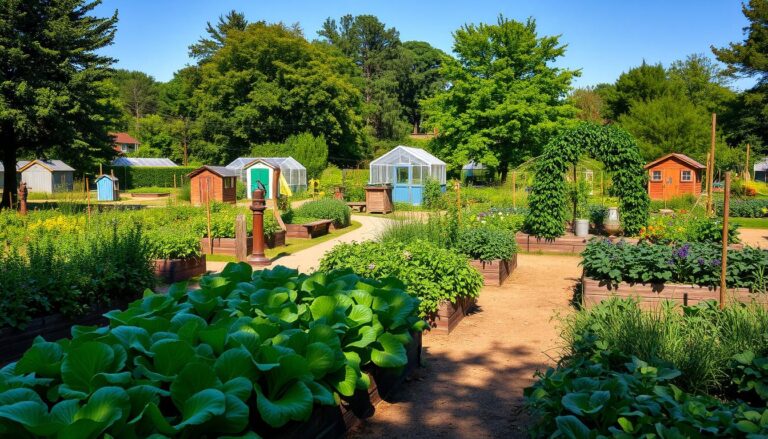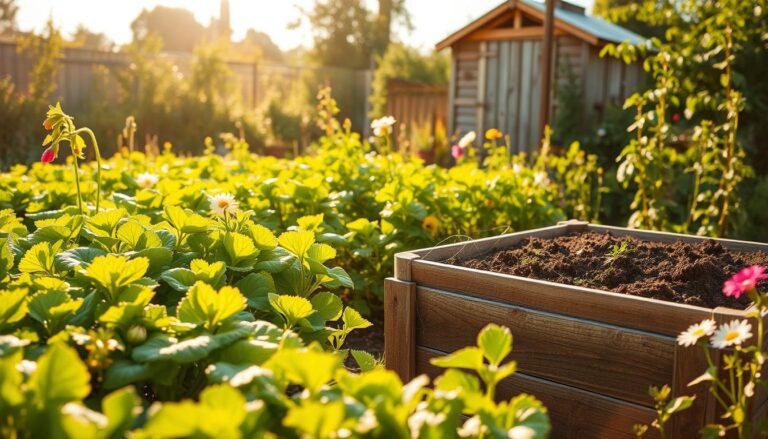Starting organic gardening is a rewarding journey. It gives you fresh produce and connects you with nature.
When you begin gardening from scratch, you’ll see many benefits. You’ll get healthier food, help the environment, and save money.
This guide will teach you the basics of starting your organic garden. You’ll get practical tips and tricks to succeed.
By the end, you’ll know how to grow your own organic produce. You’ll enjoy the fruits of your labor.
Understanding Organic Gardening for Beginners
Starting an organic garden from scratch means learning a few key principles. Organic gardening is more than just avoiding synthetic fertilizers and pesticides. It’s a way of seeing the garden as a whole ecosystem. This view is essential for organic gardening basics for beginners.
What Makes Gardening “Organic”?
Gardening is called “organic” when it doesn’t use synthetic fertilizers, pesticides, or GMOs. Organic gardening builds soil health naturally, through composting and natural amendments.
This method ensures your food is free from harmful chemicals. It also helps create a healthier ecosystem. By following organic gardening tips for novices, beginners can start their journey to sustainable gardening.
Benefits of Growing Your Own Organic Food
Growing your own organic food has many benefits. You get to control what goes into your food and enjoy fresher produce. It also helps the environment and promotes biodiversity.
| Benefits | Description |
|---|---|
| Healthier Produce | Free from synthetic pesticides and fertilizers |
| Environmental Sustainability | Promotes biodiversity and soil health |
| Freshness and Flavor | Enjoy your produce at its peak freshness |
Setting Realistic Expectations and Goals
For essentials of organic gardening for newbies, setting realistic goals is crucial. Understand that organic gardening is a learning journey with trial and error. Start small and grow your garden as you learn and gain confidence.
By setting achievable goals, beginners can enjoy the journey. They can measure their progress and find the journey to becoming an accomplished organic gardener rewarding and fun.
Planning Your First Organic Garden
Starting an organic garden is exciting. It begins with planning and preparation. Beginners need to think carefully to avoid mistakes and grow a healthy garden.
Choosing the Perfect Location
Finding the right spot for your garden is key. Most plants need at least 6 hours of sunlight daily. Check the soil and drainage too. Don’t pick a spot where water gathers, as it can harm your plants.
Tip: Watch your yard during the day to find the sunniest areas. Make sure the spot is level and drains well.
Garden Size and Layout for Beginners
Beginners should start small. A small garden is easier to care for. Plan your garden so plants get air and you can reach them easily. Growing plants together can help them grow better and keep pests away.
Essential Tools and Materials
You’ll need basic tools and materials to start. These include a shovel, fork, rake, water source, and seeds or seedlings. Compost and natural fertilizers are also good for organic gardening. Here’s a simple list of what you’ll need:
| Tool/Material | Purpose | Tips for Beginners |
|---|---|---|
| Shovel | Digging and moving soil | Choose a sturdy, comfortable shovel. |
| Garden Fork | Turning over soil | Avoid damaging roots with the fork. |
| Rake | Leveling and removing debris | Use a fan rake for leaves and a level rake for soil. |
By planning well, you can have a great organic garden. Choose the right spot, size, and layout, and get the right tools. Happy gardening!
Building Healthy Soil: The Foundation of Success
Healthy soil is essential for a successful organic garden. It provides nutrients, structure, and holds water for plants to grow well. Improving your soil is the first step to a great harvest.
Understanding Your Soil Type and Testing
To improve your soil, first know its type. Soil can be clay, silt, sand, or a mix called loam. Soil testing shows its pH and nutrient levels. You can buy a DIY kit or send a sample to a lab for detailed results.
Knowing your soil helps choose the right amendments and fertilizers. For example, clay soils hold water, while sandy soils drain fast. Adjusting your gardening to your soil type is key for plant growth.
Composting Basics for Garden Health
Composting is vital in organic gardening. It turns waste into a valuable fertilizer. This process improves soil health and reduces waste.
- Start with a mix of ‘green’ materials (like kitchen scraps) and ‘brown’ materials (like dried leaves).
- Ensure adequate moisture and aeration to speed up decomposition.
- Regularly turn the compost pile to maintain oxygen levels and prevent odors.
Compost enriches soil and supports plant growth. It’s a simple way to improve soil health.
Natural Amendments and Organic Fertilizers
Many natural amendments and organic fertilizers boost soil fertility. Examples include manure, bone meal, and fish emulsion. Each offers unique benefits like slow-release nutrients or improving soil life.
Choose amendments based on your soil’s needs. For example, manure or blood meal can add nitrogen. Always follow application rates to avoid harming plants and the environment.
Understanding your soil and using natural amendments and compost create a thriving garden. This foundation is crucial for a successful organic gardening journey.
Selecting and Growing Plants Organically
Starting an organic garden is exciting. It begins with picking the right plants for your area and space. This step makes sure your garden is not just productive but also easy to care for.
Choosing the Right Plants for Your Climate and Space
Not all plants are good for every garden. Climate and space are key to picking the right ones. For example, tomatoes and peppers need lots of sun, while lettuce and spinach prefer shade. Knowing your local weather and garden conditions helps you choose wisely.
Starting Seeds vs. Buying Seedlings
Organic gardeners often debate starting seeds or buying seedlings. Starting seeds lets you control the growing conditions and can save money. But, buying seedlings can give you a quicker start, especially for hard-to-grow plants.
“The garden is a love song, a duet between a human being and Mother Nature.” – Jeff Cox
Companion Planting and Crop Rotation Strategies
Companion planting and crop rotation boost your garden’s health and yield. Companion planting pairs plants like marigolds with tomatoes to keep pests away. Crop rotation changes what you grow in a spot to keep the soil rich and pests down.
| Companion Planting | Benefits |
|---|---|
| Marigolds with Tomatoes | Deter nematodes |
| Basil with Tomatoes | Improve flavor |
| Beans with Corn and Squash | The “Three Sisters” method |
Proper Watering Techniques for Organic Gardens
Watering your garden right is key. Deep watering helps roots grow strong, making plants drought-resistant. Using drip irrigation or soaker hoses cuts down on water loss, getting more to your plants’ roots.
- Water in the early morning or late evening to reduce evaporation.
- Avoid overhead watering to prevent fungal diseases.
- Use mulch to retain soil moisture.
By following these tips, you’ll create a lush, productive organic garden. It will bring joy and healthy food to your family.
Natural Pest and Disease Management
Effective natural pest and disease management is key to a successful organic garden. It keeps your plants healthy and productive. As an organic gardener, you’re not just growing plants. You’re creating a balanced ecosystem where plants and beneficial organisms thrive together.
Identifying Common Garden Pests and Problems
The first step is to identify pests and diseases. Common pests include aphids, slugs, and caterpillars. Diseases range from fungal infections like powdery mildew to bacterial spot infections. Regularly monitoring your garden is crucial to catch these issues early.
Inspect your plants regularly, looking for signs of distress. Look for discolored leaves, holes in foliage, or pests. Early detection is key to preventing disease spread and pest damage.
Preventive Measures for a Healthy Garden
Prevention is better than cure for garden health. Maintaining healthy soil through composting and mulching reduces disease risk. Crop rotation and companion planting also help deter pests and diseases.
A healthy garden starts with healthy practices.
“A healthy garden is not just about the absence of pests and diseases but about creating a balanced ecosystem where plants can thrive.”
Organic Solutions for Pest and Disease Control
When pests or diseases appear, there are organic solutions. For pests, use neem oil or introduce beneficial insects like ladybugs. For diseases, remove affected plants or parts and use organic fungicides.
- Neem oil for pest control
- Beneficial insects like ladybugs
- Organic fungicides for disease management
- Crop rotation and companion planting
By adopting these strategies, you can keep your organic garden healthy and productive. For beginners, start with simple methods and learn more complex ones. This builds confidence and success in organic gardening.
Conclusion: Nurturing Your Organic Gardening Journey
Starting your organic gardening journey takes patience and persistence. The essentials of organic gardening for newbies include knowing about soil health, picking the right plants, and controlling pests naturally. By following the beginner’s guide to organic gardening in this article, you’re on the right path to growing your own organic food.
Don’t get discouraged by early setbacks or challenges. Every mistake is a chance to learn and get better at organic gardening basics for beginners. Celebrate your wins, no matter how small, and enjoy the journey of growing your garden. With time and practice, you’ll grow more confident, and the benefits of organic gardening will become clearer.
Keep being curious, keep learning, and enjoy the many perks of organic gardening. Happy gardening!
FAQ
What is organic gardening, and how does it differ from traditional gardening?
How do I start an organic garden from scratch?
What are the benefits of growing my own organic food?
How do I maintain healthy soil in my organic garden?
What are some effective organic pest control methods?
Can I use seeds from my existing garden for the next season?
How often should I water my organic garden?
What are some beginner-friendly plants for an organic garden?

Sortemdia nasceu com o propósito de trazer alegria e oportunidades para todos por meio de sorteios gratuitos de prêmios incríveis. O site tem como missão oferecer experiências acessíveis, divertidas e justas para quem deseja concorrer a produtos, serviços e brindes sem pagar nada por isso. Acreditamos que a sorte pode bater à porta de qualquer pessoa — e no Sortemdia, ela pode chegar com apenas um clique.



